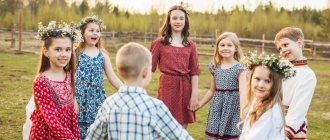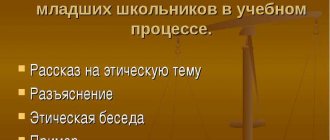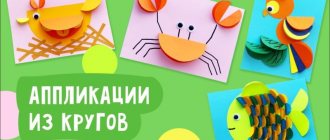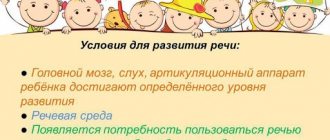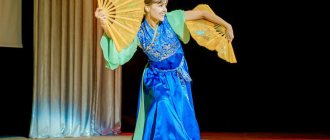The book is a holiday of the soul
Resource circle “I know a lot of good books...”Conclusion
Working under the “Origins” Program, children receive a systematic understanding of the main values of life. Through the prism of the main values of life, the child understands what is important and what is less significant in life. There is a qualitatively different understanding of useful types of activities. In other words, the child learns to choose what is vital. An essential feature of the “Origins” program is the direct participation of parents in the preparation and conduct of classes. Active interaction with a child in a kindergarten, the opportunity to observe the experience of other parents, allows adults to acquire new ways of communicating with children and adjust their own behavior. As a result of such purposeful work of the teacher with parents, parents with children, teacher with parents and children, knowledge about morality becomes meaningful, felt, conditions are created for a unified context for raising children, the development of socio-cultural space in a preschool educational institution.
LITERATURE
- Bandyak O.A., Sinitsina V.N., Kuzmin I.A. Education based on sociocultural experience: Program for primary school. – Historical studies. - T. 1. - M.: TShB, 2001.
- Bozhovich L.I. Personality and its formation in childhood. – M., 1968.
- Breslav G.M. Emotional features of personality formation in childhood: norm and deviation. – M.: Pedagogy, 1990.
- Raising children through play / Ed. Mendzheritskaya D.V., - M.: Education, 1979.
- Vygotsky L.S. Pedagogical psychology. – M.: Pedagogy, 1991.
- Zvorygina E.V. Children's first story games. – M.: Education, 1988.
- Zenkovsky V.V. Psychology of childhood. – M.: Shkola-Press, 1996.
- Zinchenko V.P. Affect and intelligence in education. – M.: Trivola, 1999.
- Ivanova M.N. Education in the context of historical studies. – Historical studies. - T. 2. - M.: TShB, 2002
- Preschooler's game./Ed. S.L. Novoselova. – M.: Education, 1989.
- Kamkin A.V., Kuzmin I.A. Origins: Program for primary school (grades 1-4) – History. - T. 1. - M.: TShB. 2001.
- The concept of regionalization of education based on historical studies. – Historical studies. - T. 1 - M.: Technological School of Business, 2001.
- Leontyev A.N. Psychological foundations of preschool play. – M.: Education, 1983.
- Lisina M.I. Problems of ontogenesis of communication. – M.: Pedagogy, 1986.
- Lisina V. On the influence of pedagogical communication on the emotional well-being of preschoolers // Preschool education. – 1994 – No. 3.
- Mikhailenko N.Ya., Poddyacheva M.N. Problems of preschool play: psychological and pedagogical aspect. – M.: Education, 1987.
- Petrovsky A.V. Personality development and the problem of leading activity. – M.: Education, 1987.
- Psychological problems of moral education of children. – M., 1977.
- Puchkova Yu.M., Tvardovskaya N.Yu. Sociocultural training is a unique pedagogical technology. – Historical studies. – T. 2. – M.: TShB, 2002.
- Development of communication between preschoolers and peers / Ed. A.G. Ruzskaya. – M.: Pedagogy, 1989.
- Smirnova E.O. Gudareva O Modern five-year-old children: features of play and mental development. // Preschool education - 2003 - No. 10 (beginning).
- Smirnova E.O. Gudareva O Modern five-year-old children: features of play and mental development. // Preschool education - 2004 - No. 3 (end).
- Ushinsky K.D. Pedagogical works: In 6 volumes - M.: Pedagogika, 1988.
- Elkonin D.B. Psychology of the game. – M.: Education, 1978.
- Yakobson S.G. Psychological problems of ethical education of children. – M.: Pedagogy, 1984.
Planning work on spiritual and moral education, calendar and thematic planning
“In childhood, a person must go through an emotional school - a school of good feelings. If good feelings are not cultivated in childhood, you will never cultivate them...",
V.A. Sukhomlinsky
The Federal Law “On Education in the Russian Federation” (Article 19, paragraph 2) indicates that the content of education should ensure “spiritual and moral development of the individual on the basis of universal socio-cultural values; its integration into national, Russian and world culture.”
The Concept emphasizes that education should be focused on achieving the national educational ideal, i.e. education of a highly moral, creative and competent citizen of Russia, “rooted in the spiritual and cultural traditions of the multinational people of the Russian Federation.”
Society can then solve large-scale national problems when it has a common system of moral guidelines. This system is being built gradually by developing respect for the native language, original national and cultural values, the memory of ancestors and the history of one’s country.
In recent years, preschool educational institutions have celebrated such church holidays as “Christmas”, “Easter”, etc., but children do not know their meaning, customs, reasons.
Childhood is the time of development of all human powers, both mental and physical, the acquisition of knowledge about the world around us, the formation of moral skills and habits. In preschool age, there is an active accumulation of moral experience, and turning to spiritual life begins - also in preschool age - with moral self-determination and the formation of self-awareness. Systematic spiritual and moral education of a child from the first years of life ensures his adequate social development and harmonious personality formation.
Target:
Education of a comprehensively and harmoniously developed personality;
To achieve the goal, it is necessary to solve the following tasks:
- To give the first ideas and concepts about society, about the Russian people and their culture, about the family;
- Form spiritual and moral qualities;
- To cultivate spiritual and moral feelings;
- Cultivate love for native nature.
- Promote the development of spiritual, cognitive and practical activities, creativity;
- To instill in children a sense of respect and love for parents and other people, and a caring attitude towards the world around them;
- Revive the traditions of family education.
Educational system approaches
- content component - children's mastery of age-appropriate ideas and concepts about the world around them: the social structure of society, the life of the people, the history of the country, culture, traditions of the people, the nature of their native land.
- emotional-motivating - the individual experiences a positive emotional attitude towards the acquired knowledge, the world around him, showing interest in this information, the need to expand his horizons, the desire to participate in socially useful work;
- the active component is the implementation of emotionally felt and conscious knowledge in activity, the presence of a complex of moral and volitional qualities, the development of which ensures an effective attitude towards the environment.
Principles of work implementation:
- the principle of encyclopedicity (the child develops ideas and knowledge about everything that surrounds him);
- the principle of cultural conformity (taking into account national values and traditions in education);
- the principle of systematicity, consistency, continuity in learning. If you follow this principle, you can achieve a positive result in your work;
- principle of effectiveness. It assumes the obligation of the teacher to communicate with the child, to find out what and how he understood and felt. For this purpose, teachers develop questionnaires and tests;
- the principle of developing self-valued forms of activity. In accordance with this principle, our students have the opportunity to explore the world through those activities that are most attractive to them.
Spiritual and moral education in kindergarten is an integral part of the comprehensive education of a child, a necessary prerequisite for the revival of national culture. A qualitatively new stage of spiritual and moral education in kindergarten is the integration of its content into the everyday life of children, into all types of children's activities and traditional methods of preschool education.
Directions of educational work:
- "The ABCs of Behavior"
- "At the origins of our native culture"
- "Educate a Man"
- "Let's talk about ethics"
- "My family"
- "Russia is my homeland"
Here the educational process is built taking into account the level of moral, spiritual and social development of children. (Thematic classes, project activities, research work, conversations, reading literature, looking at illustrations, listening to audio recordings).
To form the moral qualities of a preschool child’s personality in kindergarten, we use the following methods:
- conversations (with the help of the teacher, children learn to fairly evaluate the actions of their peers, and sometimes adults, learn to understand what is possible and what is not, what is good and what is bad),
- reading and analysis of works of fiction (Literary material is indispensable in the spiritual and moral education of a child, since it is easier for children to evaluate the behavior and actions of others than their own. For the comprehensive development of personality, we include children in various activities related to fiction.),
- games (didactic, collective games-activities, games-exercises, games-dramatization, games-fairy tales, role-playing games).
Interaction with parents.
We carry out all the work on developing moral qualities in a preschooler together with the parents: we inform them about the achievements and problems of the children, we consult with them about the individual characteristics of each child, we identify the origin of factors inhibiting development, we teach the parents themselves the techniques and methods of moral education in the family.
In order to establish close contacts with the family, to ensure unity in the education of moral culture, we use the following methods:
- general and group parent meetings;
- consultations;
- visits by teachers to families of their pupils;
- open days;
- holding joint events (exhibitions, competitions, thematic parent seminars and interviews, holidays jointly organized with parents;
- surveying and testing parents for the purpose of providing advice on family education issues;
- individual consultations with specialists (methodologists, educational psychologists)
- use of visibility: information stands for parents, mobile folders, exhibitions of children's works, educational games, literature;
- parental assistance to the educational institution (land improvement, participation in the preparation of holidays, minor repairs, housekeeping work).
Through systematic work on spiritual and moral education, we hope to achieve the following results:
- stability of behavioral skills;
- the formation of the foundations of the value spheres of the individual;
- stability of mental development;
- integrity of perception of the world;
- education of a comprehensively and harmoniously developed personality;
- forming a team where everyone is valuable and everyone is in harmony with each other;
- development of abilities for self-improvement and independent creativity;
The main result, which I would very much like to hope for, is the child’s assimilation of eternal values and his desire for good.
| Areas of work: | Content | Methodical techniques | |
| September | |||
| "The ABCs of Behavior" | Verbal politeness formulas (hello, goodbye, excuse me, thank you, please) | Ethical conversations: “It all starts with the word “hello”, “A polite request”, “Another secret of politeness, Reading: V. Oseeva “The Magic Word”, O. Driz “Kind Words”, K. Dolto-Tolich “Polite - Impolite”, G. Sapgir “The Words themselves”, V. Soloukhin “Hello”. Game exercises: “Who will say hello first,” “Goodbye, dear creature.” Role-playing game: “Let’s go to the doctor.” Acting out and discussing situations. | |
| "At the origins of Russian folk culture" | “What is born in the summer will be useful in the winter.” “Vosenushka - autumn - we mow the last sheaf.” “Bread is the head of everything.” “You can’t put your mind on a thin head” | Conversation about summer. Reading proverbs, sayings and songs about summer. A conversation about the first autumn month, its features and signs. Reading the chant “Vosenushka - autumn.” A conversation about ancient ways of harvesting bread. Introduction to millstones and their use. A conversation about intelligence and stupidity. Reading the fairy tale “About Filya” from the collection of V.N. Morokhin. | |
| "Educate a Man" | Friendly relationships. | Conversations: “Do you know how to be friends?”, “If you go on a journey with a friend.” Reading: Russian folk tales “The Cat, the Rooster and the Fox”, “Winged, Hairy and Oily”, L. Tolstoy “Two Comrades”. | |
| "Let's talk about ethics" | Friendship, camaraderie. | ||
| "My family" | My family. | Looking at family photos. Role-playing game "Family". Productive activity “Gifts for loved ones.” | |
| "Russia is my homeland" | My street, home address. | Presentation Tour of the streets. Looking at photographs of nearby buildings. Didactic games and exercises: “I live on the street...”, “My address...”, “Residential - non-residential”, proverbs, sayings about friendship, riddles about city buildings. Role-playing game "Journey along the street." Role-playing game "School". Conversation about the work of a teacher. | |
| October | |||
| "The ABCs of Behavior" | "Telephone Etiquette" Formation of forms of verbal politeness | Conversation “Rules for talking on the phone.” Reading: A. Barto “Friends, just in case, here are poems about a boy”, A. Kondratyev “Good afternoon”, S. Marshak “A lesson in politeness”, A. Shibaev “Uncle Sasha is upset.” Didactic games: “Polite stream”, “My phone rang.” Acting out and discussing situations. | |
| "At the origins of Russian folk culture" | “The village of Rybachy is my small homeland” “October is a dirtbag - it doesn’t like wheels or runners.” "Evil Extermination" | The teacher's story about the history of the village. Viewing and condemnation of the presentation “My Small Motherland” A conversation about the characteristic signs of October. A story about the national holiday Intercession. “Harvest Festival” together with parents | |
| "Educate a Man" | "Caring for babies and the elderly." Elderly Person's Day. | Conversations: “How can we take care of our elders”, “We are protectors of children”. Reading: r.n.s. “Geese-Swans”, A. Barto “Special Assignment”, “So Defender!”, G. Vieru “Mom, Why?”, L. Tolstoy “Old Grandfather and Granddaughter”, E. Shim “Brother and Younger Sister” , “Don’t you dare offend!” | |
| "Let's talk about ethics" | "Kindness and Caring" | Didactic exercise “Kind words to grandparents.” Productive activity “Gifts for the elderly” Annex 1 | |
| "My family" | "My Parents' Work" | Meeting with parents (story about professions). Conversations: “Where our mothers work,” “How our fathers work.” Reading: S. Mikhalkov “What do you have?” Didactic game “Guess the profession.” | |
| "Russia is my homeland" | “Our city, region - industrial enterprises, cultural centers, monuments.” | Looking at postcards, illustrations, photographs. Photo exhibition “How we relax.” Conversation “What our city has for children.” Productive activity “My favorite vacation spot.” Monument to the memory of the death of the submarine L-16 Excursion to the Ocean Sports Complex and the Ice Palace | |
| November | |||
| "The ABCs of Behavior" | "Rules of conduct in public places" | Conversation “How to behave in kindergarten, in transport, so that everyone has a pleasant and good time.” | |
| "At the origins of Russian folk culture" | "Better to see once than hear a hundred times". "Titmouse's day." “Where does the Firebird’s feather live?” "Golden Khokhloma". | Virtual tour of the memorable places of the village “Why are the streets named like that?” A story about the holidays Sinichkin Day and Kuzminki. Introducing children to Khokhloma painting. The teacher’s story about the traditions of gold painting (“kudrina”, “grass”, etc.). | |
| "Educate a Man" | “Taking care of the kids, the weak. Sympathy, responsiveness" “Formation of positive habits, healthy lifestyle” | Conversation: “Don’t be afraid of the strong, protect the weak.” Reading: A. Barto “Vovka is a kind soul.” Acting out and discussing situations: “How can you express sympathy.” “How to console and take pity on the offended.” Participation in the Promotion: “I choose sports as an alternative to bad habits” Appendix 2 | |
| "Let's talk about ethics" | “Developing an understanding of the need to keep your promises.” | Conversations: “If you promised, then keep it,” “You gave your word, keep it.” | |
| "My family" | "My ancestry." Mothers Day | Looking at family photos. Drawing up a family tree (with parents). Conversation “My Genealogy.” Role-playing game "Family". A surprise holiday for mothers. Making gifts “Flowers of Mood” Appendix 3 | |
| "Russia is my homeland" | “The capital of our Motherland is Moscow.” | Looking at illustrations. Didactic games: “Travel around Moscow”, lotto “Moscow”. Role-playing game "Tour Guides". | |
| December | |||
| "The ABCs of Behavior" | “Verbal forms of expressing gratitude” | Game exercises to develop a culture of verbal communication. | |
| "At the origins of Russian folk culture" | “Winter is not summer, - dressed in a fur coat.” “It shines, but it doesn’t warm.” “The frost has come - take care of your ears and nose.” “The Snow Maiden is the granddaughter of Father Frost.” Getting ready for Christmas | Conversation about the characteristic features of winter. Execution r.n. songs “Like thin ice.” Conversation about different lighting sources. Shadow theater show. Reading a fairy tale by V.F. Odoevsky "Moroz Ivanovich". Making riddles about frost. Reading the fairy tale "The Snow Maiden". Listening to fragments of the opera by N.A. Rimsky-Korsakov "The Snow Maiden". Learning carols Master class for mothers and children on making Christmas decorations. | |
| "Educate a person" | “Formation of feelings of care and love for loved ones.” | Conversations: “How a mother takes care of everyone,” “How we take care of our loved ones.” Reading: V. Oseeva “Just an Old Lady”, “Sons”. Participation in the all-Russian campaign “Feed the Birds”, making feeders and opening bird canteens Appendix 4 | |
| "Let's talk about ethics" | “Formation of the idea of a sensitive, caring attitude towards others.” | Reading: V. Kataev “The Seven-Colored Flower”, E. Koshevaya “My Son”. | |
| "My family" | "Family traditions". | Teacher's story "What is tradition." Conversation: “Traditions of your family” Productive activity: “Our home holiday” Project “Coat of Arms of My Family” Appendix 5 | |
| "Russia is my homeland" | "New Year in Russia and other countries." | A teacher's story about celebrating the New Year. Productive activity: “Homemade toys for the Christmas tree.” | |
| January | |||
| "The ABCs of Behavior" | "Rules of conduct in public places." | Conversation “How to behave in a store, transport.” Playing out situations: “We came to the store (pharmacy, hospital). | |
| "At the origins of Russian folk culture" | “Kolyada came on the eve of Christmas.” "Winter Patterns". "Gzhel is beautiful." "Christmas holidays". "Baptism". | Conversation about Christmas holidays, Christmas fortune-telling. Getting to know the creativity of Vologda lacemakers. A teacher's story about Gzhel arts and crafts. A teacher's story about folk traditions and holidays in Rus'. Looking at illustrations. Theatrical production "Christmas Tree". | |
| "Educate a Man" | "Modesty". | Conversation: “Modesty and boasting”, “Who do we call modest.” Reading r.n.s. "The hare is bragging." Watching the cartoon “What a Wonderful Day.” | |
| "Let's talk about ethics" | “Modesty is a positive character trait.” | ||
| "My family" | “Our kindergarten is a big family.” | Looking at photographs from the kindergarten archive. Teacher's story. Role-playing game "Family - New Year's Eve." Productive activities: gifts for kindergarten students. | |
| "Russia is my homeland" | “We live in Russia: diversity of nature, wildlife, nationalities. | Looking at illustrations of different climate zones, animals, maps and globes. Conversation “We live in Russia.” Role-playing game “Travel to Russia”. | |
| February | |||
| "The ABCs of Behavior" | “Formation of a culture of conversation and argument.” Culture of behavior in nature | Conversation “Politeness in Conversation.” Didactic exercises: “Prove that you are right.” Acting out and discussing situations. Creative research project “Take care of nature” Competition "Green Planet" Appendix 6 | |
| "At the origins of Russian folk culture" | “The master’s work is afraid.” “A song lives among the people.” “Glory flows to the hero.” “Maslenitsa Praskoveika, we welcome you well!” | Didactic game “Who needs what for work.” Conversation about Russian folk song. A teacher's story about Russian heroes. Conversation about Maslenitsa. Singing songs, ditties. Together with parents Celebration “Farewell to Winter” Appendix 7 | |
| "Positive moral qualities" | "A chivalrous attitude towards girls." | Conversation “What real men should be.” Reading: A. Akhundova “Beautiful Girl” | |
| "Let's talk about ethics" | "Modesty and arrogance." | Teacher's story. Reading r.n.s. “The Boasting Hare”, S. Marshak “The Story of an Unknown Hero”, “Fire”. | |
| "My family" | "Care and attention" | Visiting younger groups, providing assistance in dressing for a walk, playing games together. Conversation “caring for the younger is the honorable duty of the elders.” Reading: M. Boroditskaya “Waiting for Brother”, “Observation”, “Opening”. Campaign “Send to a friend in the Army” | |
| "Russia is my homeland" | “State symbols of Russia: flag, coat of arms, anthem.” “Defender of the Fatherland Day: military service is a difficult and honorable duty.” | Consideration of Russian symbols. Listening to the Russian anthem. Teacher's story. Productive activity "Russian flag". Targeted walks to monuments to war heroes. Conversations: “Our dear army protects our peaceful labor,” “What is heroism.” Role-playing games: “Pilots”, “Military exercises”. Celebration together with parents and military personnel “Defender of the Fatherland Day” Appendix 8 Productive activity Making gifts for dads Appendix 9 | |
| March | |||
| "The ABCs of Behavior" | "Guest Etiquette" | Conversation “Guests to the house - joy in it.” Reading: O. Grigoriev “Hospitality”, S. Marshak “Cat’s House”. Didactic exercises: “Meeting guests”, “Saying goodbye to guests”. | |
| "At the origins of Russian folk culture" | “A mother’s heart warms better than the sun.” "Russian doll". "The Poetry of Folk Costume". “Rook on the mountain - spring is in the yard” | Ethical conversation about mother with the inclusion of folk proverbs. A story about a nesting doll. A story about folk costume. A conversation about Russian customs of welcoming spring. | |
| "Educate a Man" | "Evaluating your actions." | Conversations: “Are you always right”, “What is good and what is bad.” Acting out and discussing situations. | |
| "Let's talk about ethics" | "Honesty and deceit." | Conversation "Truth and lies." Reading: L. Tolstoy “Bone”, N. Nosov “Cucumbers”, V. Oseeva “Why?”. | |
| "My family" | “Convention on the Rights of the Child”: the right to a name, citizenship. | Conversations: “To whom they give what names”, “Such different children” (nationalities and races), “Name day - a celebration of the name.” | |
| "Russia is my homeland" | "International Women's Day" Submariner's Day | Conversations about mom. Matinee dedicated to the women's holiday "Mother's Day". Productive activities: gifts for mothers and grandmothers Master class for children “Preparing vinaigrette and cookies for mothers and grandmothers” Appendix 10 Festive concert for Submariner Day Appendix 11 | |
| April. | |||
| "The ABCs of Behavior" | "Rules of conduct in public places." | Conversation “How we behave on the street.” Didactic exercises: “We are walking down the street,” “We are in a store.” | |
| "At the origins of Russian folk culture" | “To make a joke is to make people laugh.” “Travel on the golden-maned miracle troika.” "Red hill". | A conversation about folk humor. Word game "Confusion". A teacher's story about the masters of Palekh. A story about Easter. Verbal folk games “Gardener”, “Spillikins”. Project "My Easter" Appendix 12 | |
| "Educate a Man" | "Justice and Benevolence" | Conversation “Justice is a good quality of a person.” Reading: A. Barto “I’m superfluous”, G. Ladonshchikov “I don’t cry.” Didactic exercise “How to say so as not to offend.” | |
| "Let's talk about ethics" | "Justice". | ||
| "My family" | "Convention on the Rights of the Child". | Looking at illustrations. Conversation “We and our rights.” | |
| "Russia is my homeland" | "Cosmonautics Day: the first human flight into space." | Examination of portraits and illustrations. Conversation “We are the first in space.” Reading: M. Vodopyanov “Cosmonaut-1”, “106 minutes outside the Earth”. Role-playing game “Cosmonauts, take flight!” | |
| May. | |||
| "The ABCs of Behavior" | "Culture of behavior in nature." | Consideration of the Red Book of the Kamchatka Territory. Environmental campaigns: “Our city must be clean”, “Memo for those traveling to nature”. | |
| "At the origins of Russian folk culture" | “A man without a homeland is like a nightingale without a song.” | A conversation about the past of our native land and our fellow countrymen. Viewing filmstrips. | |
| "Positive moral qualities" | "Culture of other peoples." | Teacher's story. Examination of illustrations on the topic. | |
| "Let's talk about ethics" | "Industriousness and laziness" | Conversation “Work spoils a person, but laziness feeds him.” Reading r.n.s. “Khavroshechka”, E. Permyak “How Masha became big.” | |
| "My family" | “May 15th is International Family Day.” | Conversation about family. Looking at family photo albums. Sports festival “Mom, Dad, Me – a sports family” Appendix 13 | |
| "Russia is my homeland" | "Victory Day". | Meeting with veterans of the Great Patriotic War. Conversations: “What is heroism”, “We remember heroes.” Looking at illustrations. Reading: S. Alekseev “The First Column”, “E. Blagina “Overcoat”, E. Trutneva “Parade” Participation in the celebration of the anniversary of Victory Day. Laying flowers at the memorial “L-16” (Children and parents) Appendix 14 | |
Bibliography:
- Borovkova E.B., Vodina N.I., Efimov M.K. Formation of moral health of preschool children. Classes, games, exercises. - M.: TC Sfera, 2013.
- Zyabkina V.V., Lgovskaya N.I., Miklyaeva N.V. Moral and aesthetic education in kindergarten and school: implementation of modern federal requirements. Methodological manual. - M.: TC "Perspective", 2011.
- Knyazeva O.L., Makhaneva M.D. Introducing children to the origins of Russian folk culture. Educational and methodological manual. – St. Petersburg: Detstvo-Press, 2010.
- Kondrykinskaya L.A. Where does the Motherland begin? Experience in patriotic education in preschool educational institutions. - M.: TC Sfera, 2013.
- Kutsakova L.V. Labor education in kindergarten. For classes with children 3-7 years old - M.: Mozaika-Sintez, 2014.
- IN AND. Petrova, T.D. Chair. Moral education in kindergarten. Program and methodological recommendations. – 2nd ed., rev. and additional – M.: Mosaika-Sintez, 2014
- Petrova V.I., Stulnik T.D. Ethical conversations with preschoolers. For classes with children 4-7 years old. – M.: Mozaika-Sintez, 2015.
- Approximate general educational program for preschool education “From birth to school” edited by N.E. Veraksa, T.S. Komarova, M.A. Vasilyeva - M.: Mozaika-Sintez, 2016
